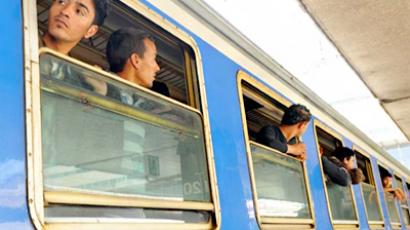Borderline control freaks – Schengen tightens up
A much-desired entry to the European-Passport-free Schengen zone for Romania and Bulgaria has been blocked by some EU members, amid concern over high crime rates and lax border controls.
Since the Arab Spring, Schengen countries have been reconsidering their own frontiers. The Schengen zone is a European dream come true, a continent without borders – freedom to travel, live and work across 25 countries. However, attempts by Bulgaria and Romania to become part of the zone have been a wake-up call. Anke Van Der Meersch, a Belgian senator from the Vlaams-Belang party, expressed concerns that, apart from regular people, organized crime would also flow through the gates of Romania and Bulgaria.“Also illegal immigrants will come through Turkey to Romania and Bulgaria and have free access to Schengen countries, which is not good,” Van Der Meersch told RT. “Europe has to protect itself, and it’s more important than people in Bulgaria or Romania traveling with a visa and having a border control.”This is a question that is more relevant now than ever. France and Italy fell out earlier this year when hard-pressed Italy issued more than 20,000 refugees from the Arab Spring with 6-month residency permits, giving them permission to travel anywhere in the EU. Both countries now want internal border controls strengthened.
Overall, the number of asylum seekers in the EU during the first quarter of 2011 increased by 4,000 compared with the same period of the previous year. In total, nearly 66,000 persons sought asylum in EU Member States. France and Germany remained the top destination countries of asylum applicants with 14,300 and 12,000 applicants respectively. According to the latest statistics, 6.5 per cent of the EU population are foreigners and 9.4 per cent are born abroad.Data by Eurostat.
Those are just the legal migrants, but there is also the question of illegal immigration – Bulgaria’s accession to Schengen was delayed when its border with Turkey was found to be full of holes.“If you have countries who aren’t doing a lot to protect their borders from an influx of illegal immigrants – a massive influx of them – [it] is not something that’s diplomatically supported,” says Pieter Cleppe, head of Open Europe. “In that scenario, when you have these countries – think of Romania, Bulgaria, maybe even Greece – it’s not unreasonable to put higher barriers to these countries if they want freedom of movement.”Danish MEPs from all parties have voiced concerns about Bulgaria’s and Romania’s entry into Schengen. They cite corruption and crime as the main reasons, and agree with France and Italy that the scheme should be reformed. Denmark has already reintroduced border controls.“I think we just need to be frank and realize that the Schengen agreement has led to a huge raise of criminal activity. Knowing the development in Romania and Bulgaria, you have to be very naive not to see that this raise would be even higher if the border control was abolished to these countries as well,” Morten Messerschmidt, a Danish MEP, told RT.This is not a done deal for Romania and Bulgaria. Although they are recognized to have improved border controls, Schengen members also want them to work on crime prevention inside their own borders before opening them up.And that is quite apart from the destabilizing effect of yet more mass migration in an already-unsteady Europe.Many in the EU were not specifically worried about Romania and Bulgaria trying to join the European passport-free zone, but of the widening of the agreement as a whole. In essence, it means trusting those on the edge of the Schengen zone enough to make their borders your borders. However the question remains of how wise this move is, particularly at a time when unrest in Arab countries means thousands of North African and Middle Eastern refugees have already found their way into Europe.














